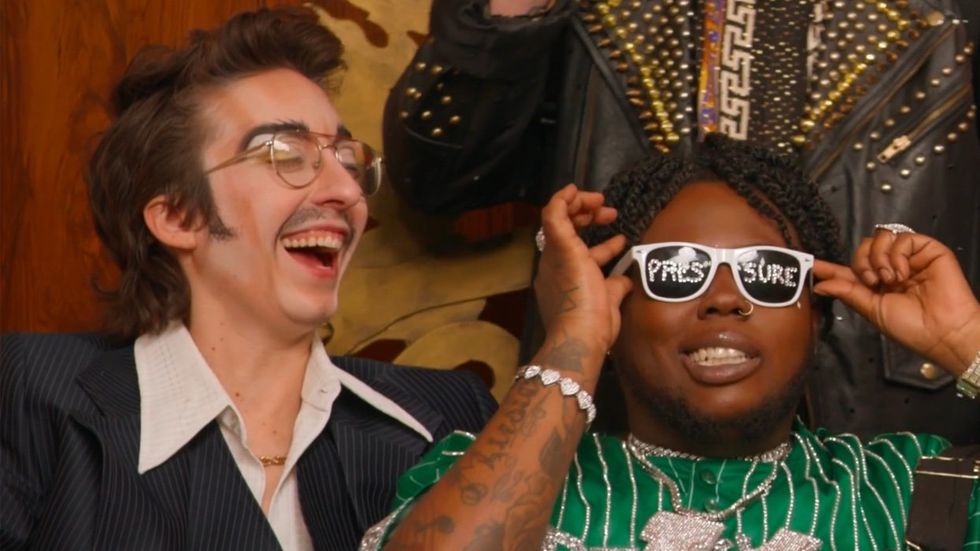
WWW.OUT.COM
'King of Drag' sets a new bar for masculinityand it's revolutionary
This week, King of Drag's inaugural season took its final bow, crowning its first-ever King of Drag. For fans of the art form, it was a moment long awaitedeagerly, impatiently, and with no small amount of outrageas similar shows went on for season after season with little to no king representation. So when this groundbreaking series, with its cast of incredible AFAB, nonbinary, and trans masc stars finally dropped, it felt like a collective exhale. An essential and yet underrepresented segment of the drag community was finally getting its due. Sign up for the Out Newsletter to keep up with what's new in LGBTQ+ culture and entertainment delivered three times a week straight (well) to your inbox!And get it, they did. The show proved to be an incredible showcase for drag kings from across the nation, offering up a wonderfully diverse interpretation of kinging. King of Drag had it all: It was glamorous, campy, hilarious, and thought-provoking. While watching, it tugged on our heartstrings and filled us with a productive, indignant kind of ragerage at the industrys previous lack of inclusion, the cruelty of parents who dismissed or demonized their queer and transgender kids, and a political climate that seeks to criminalize their very existence. To be clear, the world would be a lesser place without their presence.King of Drag did more than just make space or entertain, as it also laid out a blueprint for a revolutionary new kind of masculinity. Its a vision of maleness that pushes back against the oppressive individualism of patriarchyone that offers freedom for women, trans and nonbinary folks, and yes, men.Speaking with the kings each week as they left the competition, one theme came up again and again: their deep support for one another, despite the trappings of reality show competition. Dick Von Dyke shared a story in which the kings, en route to buy materials for a design challenge, led by Henlo Bullfrog hatched a plannot just to shop for themselves, but for each other. They all enthusiastically signed on, pulling materials that would not only elevate their looks but help their brothers shine, too, sharing supplies, photos, and encouragement along the way.This isnt just good sportsmanship. It speaks to something deeper about the kings and the spirit of King of Drag itself, and how powerfully they differ from other competition series which rely on conflict and reflect a drag-eat-drag world.While both masculinity and reality TV have traditionally been rooted in individualism and the climb to the top, King of Drag and its stars disrupted that norm. They transformed what was ostensibly a competition show into a collaborative exercise. This series proves how much more entertaining these types of programs could be if the primary conversation around them wasnt about whos failing, should go home, etc. but rather the passion and artistry of their cast.What could we accomplish as a people, as a species, if masculinity meant selfless cooperation and the uplifting of others, regardless of gender? How free would each and every one of us be if success didnt always require a scramble to the top over a heap of bodiesboth metaphorical and, heartbreakingly, actually? To put it in fictional terms: a masculinity that is more in line with Ted Lasso than, say, John Wayne. The kings themselves have a way of describing this: king shit.We act with a level of dignity and respect for each other and humility, and [honor], Buck Wylde, a Texas-based king who competed in the season previously told Out's sister publication, PRIDE. They explained how this collective-focused ethos becomes a part of the ways they express and perform masculinity. Backstage at our king shows, we say stuff like, You make me want to be a better King. We grab each other and hug and say, You're respected in your industry. We bump chests and we build each other up before we go out on stage, just so we remind each other how important each of us is to each other and to the world. The kindness and the puffery are the point; and the result is more freedom. Freedom to take up space, freedom to express themselves and their art, freedom to feel they are enough. It's a concept that bell hooks explored in her book A Will to Change. In patriarchal culture, males are not allowed simply to be who they are and to glory in their unique identity, she wrote. Their value is always determined by what they do. In an anti-patriarchal culture males do not have to prove their value and worth. They know from birth that simply being gives them value, the right to be cherished and loved. Its not lost on me that King of Drag may also represent the greatest and most diverse cast of trans mascs weve seen on screen together. The show doesnt tokenize its trans menit celebrates them, offering a platform to express their trans maleness, opening up about what it cost them and how they were rewarded by bravely claiming their truest identity. Simply existing and exploring their craft on screen is a political act, and the brotherly connection the cast shared in essence helped create a net that allowed them the space and the safety to do so without looking over their shoulders, at least while they were in the Man Cave.With that journey comes a lot of thought, soul-searching, and incredible art. But it also made for rich and thoughtful conversations about gender identity and masculinity. For some, kinging is about reconciling both the masculine and feminine within us, as Alexander the Great described to PRIDE: I feel like my drag has already gone on such a journey of gender expansiveness and helping people understand that masculinity can be soft, flamboyant, effeminate, whatever, and still be masculine. For others, it was about decoupling toxicity from maleness. Or for contestant Big D, it was about defanging toxic masculinity by lampooning it. My job is to take toxic masculinity and make it funny, they told PRIDE.While they make light of mediocre masculinity in their work, its born of great empathy. One of the things I really do in my workshops is get participants to access the sadness and rage that is at the heart of a lot of the masculine experience. Its actually really hard being a man, Big D explained.Again, Bell Hooks spoke to this exact concept: Learning to wear a mask (that word already embedded in the term masculinity) is the first lesson in patriarchal masculinity that a boy learns, she wrote in The Will to Change. He learns that his core feelings cannot be expressed if they do not conform to the acceptable behaviors sexism defines as male. Asked to give up the true self in order to realize the patriarchal ideal, boys learn self-betrayal early and are rewarded for these acts of soul murder.Ultimately, masculinitylike femininityis a social construct. One we collectively create, define, uphold, or deconstruct. What if masculinity and its expression could expand to become something that centers empathy, that eschews the individualism that preys on the weak and rewards the disposability of others? This feels particularly poignant in this moment, when the man occupying the White House is taking his country for a terrible ride as he exemplifies the most heinous and harmful aspects of toxic masculinity: cruelty, corruption, and pursuit of self over all else and with depraved abandon.It may feel like an impossible task, but King of Drags greatest contribution might not just be the queer and trans joy it highlighted and centeredthough that was important and impactful toobut the roadmap it incidentally laid out for a radical new way to be a man.
0 Comments
0 Shares
95 Views
0 Reviews



